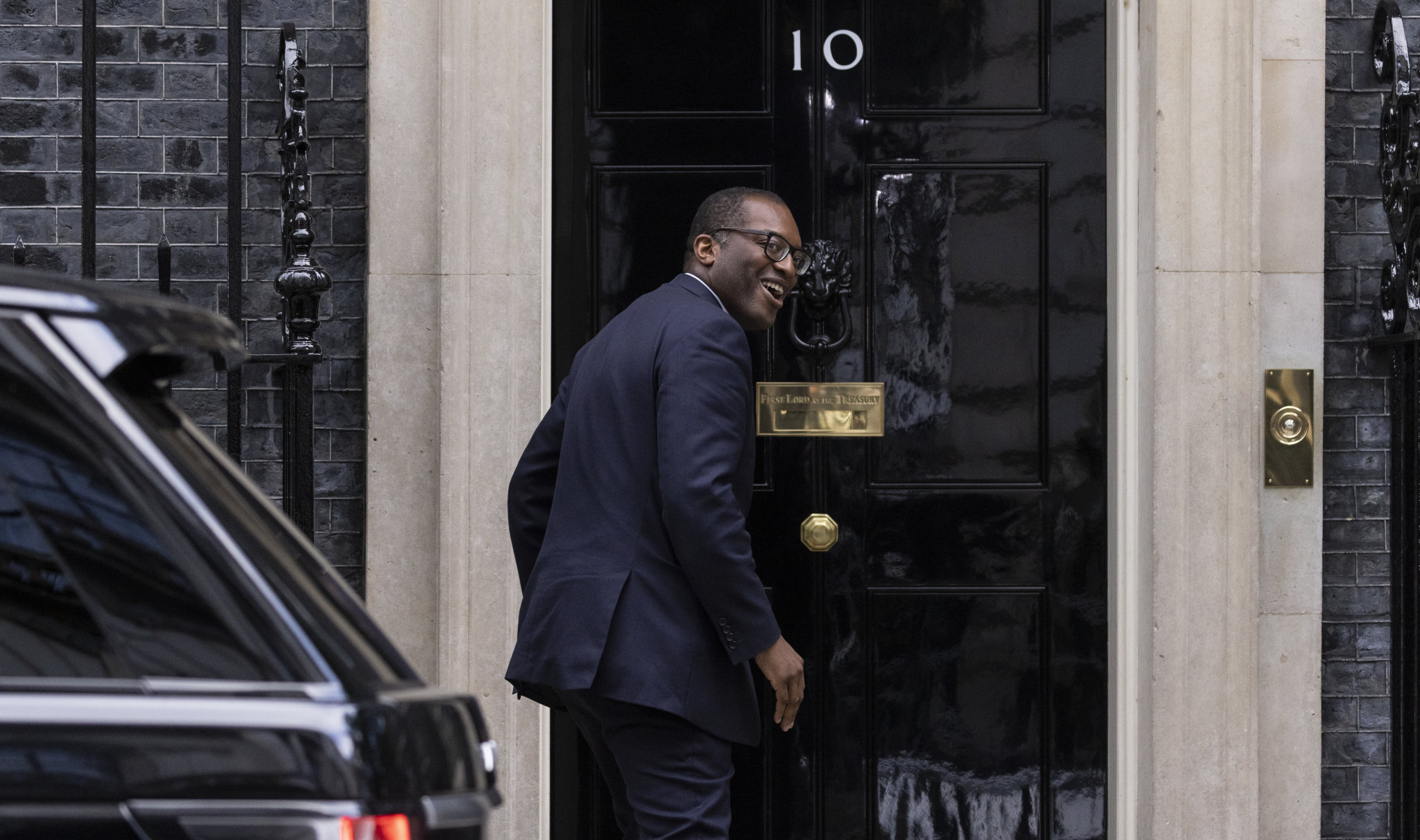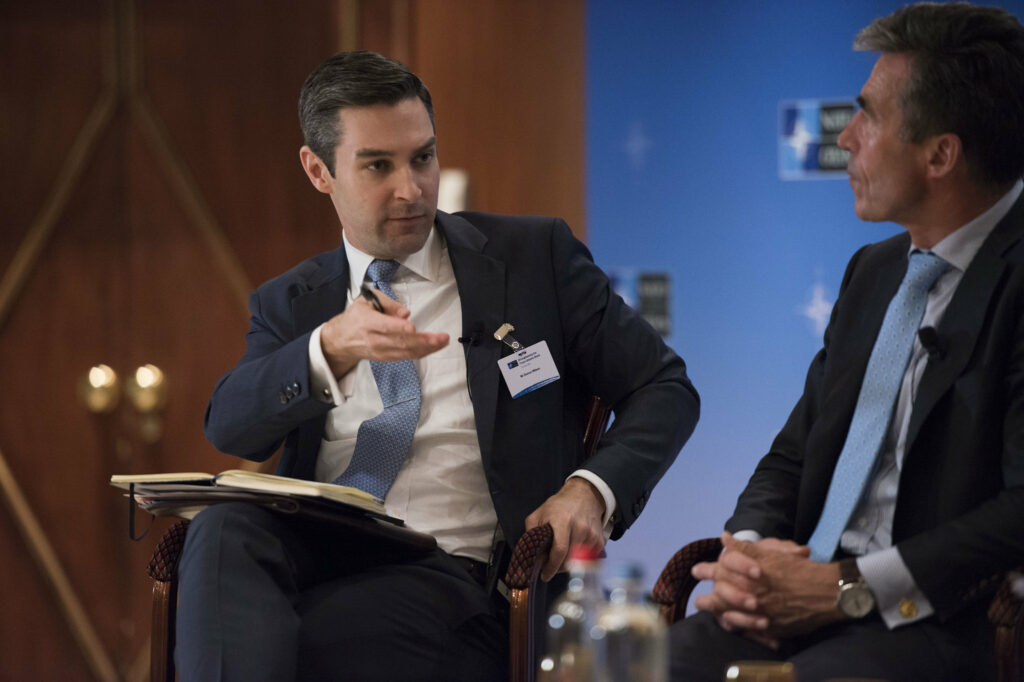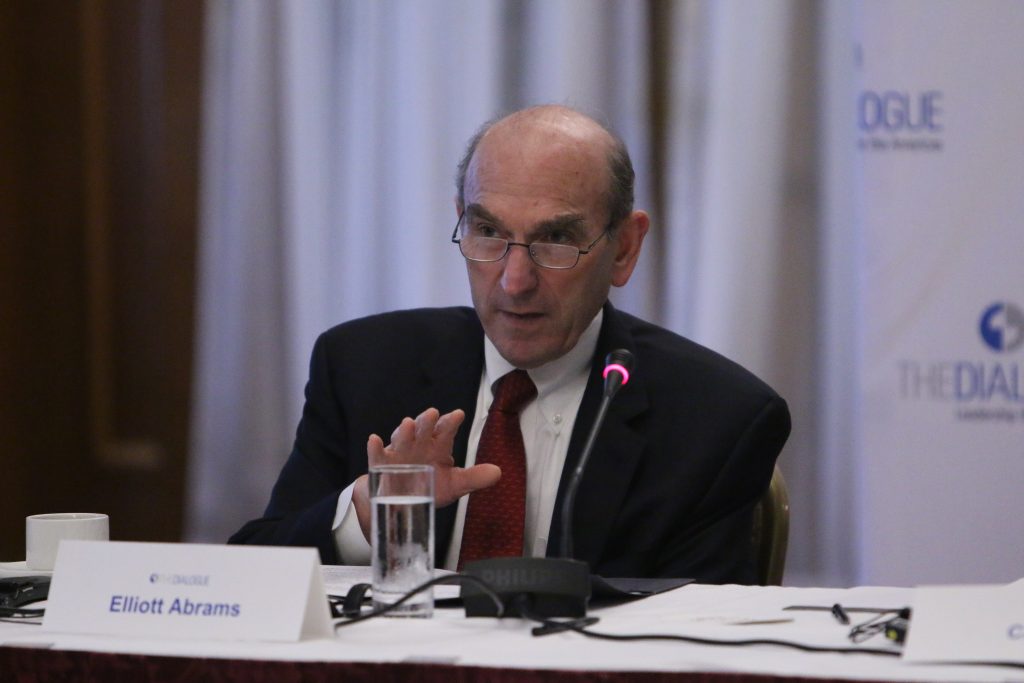A US government-funded agency that claims to promote democracy but which helps undermine governments independent of Washington has moved decisively into Britain’s media space since 2016.
17 JANUARY 2022
- National Endowment for Democracy (NED) has funded groups such as Bellingcat, Index on Censorship, Article 19, Finance Uncovered, and the Thomson Reuters Foundation
- Former CIA officer tells Declassified the NED is a “vehicle” for US government “propaganda”
The National Endowment for Democracy (NED), a non-profit corporation funded by the US Congress, has ploughed over £2.6m into seven British independent media groups over the past five years.
The NED was “created…to do in the open what the Central Intelligence Agency has done surreptitiously for decades”, the New York Times reported in 1997. That included spending millions of dollars to “support things like political parties, labor unions, dissident movements and the news media in dozens of countries.”
Since the end of the Cold War, the NED has grown and been involved in trying to undermine or remove governments independent of Washington, including democratic ones in Bolivia, Ecuador and Venezuela.
Allen Weinstein, the director of the research study that led to creation of the NED in the 1980s, remarked in 1991: “A lot of what we do today was done covertly 25 years ago by the CIA.”
The NED has traditionally focused on Eastern Europe, Latin America and Asia. But Declassified has found that the organisation has recently funded three British media outlets and four UK press freedom groups. All are seen as on the progressive end of the political spectrum.
NED money has gone to UK investigative groups Bellingcat, Finance Uncovered and openDemocracy, as well as media freedom and training organisations Index on Censorship, Article 19, the Media Legal Defence Initiative, and the Thomson Reuters Foundation.
“A lot of what we do today was done covertly 25 years ago by the CIA.”
Since 2016, these groups have received £2,638,967 from the NED, putting it among the largest institutional funders of alternative media outlets and press freedom groups in the UK.
The NED has also given hundreds of thousands of pounds to foreign media groups with a significant presence and affiliates registered in Britain, including Internews, PEN and Reporters Without Borders.
‘Sugar daddy of overt operations’
The NED was created in 1983 by President Ronald Reagan, who set out the idea in a set-piece speech in Westminster, in front of prime minister Margaret Thatcher. The aim, he said, was “to foster the infrastructure of democracy”.
This was a time of embarrassing scandals for the CIA. A Washington Post article soon noted: “The old concept of covert action, which has gotten the agency [CIA] into such trouble during the past 40 years, may be obsolete.”
The NED was meant to defend against these scandals by putting certain programmes out into the open. “The sugar daddy of overt operations has been the National Endowment for Democracy,” the Washington Post continued. “Through the late 1980s, it did openly what had once been unspeakably covert”.
CIA whistleblower Philip Agee, who served in the agency in the 1960s, commented in 1995: “Nowadays, instead of having just the CIA going around behind the scenes and trying to manipulate the process secretly by inserting money here and instructions there and so forth, they have now a sidekick, which is this National Endowment for Democracy.”
RELATED

SECRET ‘CIA-FUNDED’ GROUP LINKED TO UK MINISTERSREAD MORE
John Kiriakou, a CIA officer from 1990 to 2004, told Declassified that recent changes in the law have widened the potential targets of US information operations. “In 2011, the US Congress changed the law that forbade the Executive Branch from propagandizing the American people or nationals of the other ‘Five Eyes’ countries—the UK, Canada, Australia, and New Zealand,” he said.
“The National Endowment for Democracy, like Radio Free Europe/Radio Liberty, countless Washington-area ‘think tanks’, and Radio/TV Martí, are the vehicles for that propaganda”, he added, referring to the US broadcaster that transmits to Cuba.
Kiriakou, who served in the agency’s core Directorate of Operations, continued: “And what better way to spread that propaganda than to funnel money to ‘friendly’ outlets in ‘friendly countries’? The CIA’s propaganda efforts throughout history have been shameless. But now that they’re not legally relegated to just Russia and China, the whole world is a target.”
Bellingcat
The UK organisation Bellingcat, which is known mainly for its investigations of Russian secret service operations, has been funded by the NED since at least 2017.
Bellingcat is the only UK media outlet in receipt of NED funds which does not return results on the NED’s grant search so the full extent of its support for the organisation is unclear. Bellingcat did not respond to Declassified’s questions.
The group is registered as a foundation in the Netherlands and its 2020 accounts show it received €112,524 (£94,000) from the NED that year, making the US agency one of Bellingcat’s largest institutional funders. What appears to be another NED grant is also referenced in the accounts, but the amount is not divulged.
Bellingcat’s 2019 accounts declare no grants from the NED, but its annual report from the same year lists the US agency as a “donor”. Declassified could not find accounts from previous years.
Elsewhere, Bellingcat mentions the NED as one of its “strategic partnerships”, adding that it has “attracted the attention (and financial support)” of the US agency “to both expand its work in research and training, and to professionalize its organisation.”
Bellingcat’s founder and director, Eliot Higgins, was hired in 2016 as a fellow by the Washington-based Atlantic Council, a think-tank funded by the US State Department and NATO’s “public diplomacy” division, among others.
The NED’s current head, Damon Wilson, was previously executive vice president at the Atlantic Council. Before that he had senior roles in the US Embassy in Baghdad, at NATO and the US National Security Council where he was “helping to enlarge NATO”.
In September 2021, Bellingcat announced a new six-person international advisory board, which included Francis Fukuyama, a former US State Department official under Reagan who recently sat on the board of the NED.

Bellingcat appears to be close to the British government. A leaked document from a Foreign Office contractor noted that – after the UK “identified North Macedonia as a priority country” – during its 2019 presidential election it “deployed” a number of “partners” to the country as part of its “response”, including Bellingcat.
The following year, in July 2020, Bellingcat published an article entitled “Russian interference in North Macedonia: A View Before the Elections” ahead of the country’s parliamentary vote.
In 2020, Bellingcat was one of four founding “partners” in the Open Information Partnership (OIP), an alliance of organisations “to counter and expose disinformation” funded wholly by the UK Foreign Office. Members of the alliance include the NATO Strategic Communications Centre of Excellence.
It is unclear if Bellingcat received funds through the OIP because the Foreign Office says it does not hold records.
Bellingcat states that it “does not solicit or accept funding and contributions directly from any national government.” The NED’s structure as a private nonprofit that is funded by the US Congress allows its grantees to have such policies and still receive its funds.
‘Strictly protect’
Index on Censorship, the UK’s foremost free expression group which monitors threats to free speech and publishes censored writers, received £603,257 from the NED in 2016-2021, according to its Charity Commission accounts.
Index’s chief executive, the former Labour MP Ruth Smeeth, was appointed in June 2020 – six months after losing her seat in parliament. A US diplomatic cable, published by WikiLeaks in 2010, named Smeeth as a “strictly protect” informant for the US embassy in London.
The cable – written in 2009 by US deputy chief of mission in London, Richard LeBaron – noted: “Labour Prospective Parliamentary Candidate for Burton Ruth Smeeth (strictly protect) told us April 20 that [prime minister Gordon] Brown had intended to announce the elections on May 12”.
The cable continued that “a despondent Smeeth said” Brown had to abandon his election plan after a drop in Labour’s poll numbers following a media scandal. LeBaron added: “This information has not been reported in the press.”
The cable was classified as “confidential” and “not for foreign eyes”. Before being posted to London in 2007, LeBaron had been deputy chief of mission at the US embassy in Israel.
“This information has not been reported in the press.”
From 2005-7, Smeeth was director of public affairs and campaigns at the Britain Israel Communications and Research Centre (BICOM), a prominent pro-Israel lobby group with close links to the Israeli government. Its current director joined BICOM directly from the Israeli prime minister’s office.
Index – whose funders also include the Charles Koch Foundation, Facebook and Google – did not respond to Declassified’s questions about its NED grants.
One of the founders of Index in 1972, the poet Stephen Spender, had earlier resigned as editor of Encounter magazine when it was exposed as being funded by the CIA. Spender said he was unaware of the funding arrangements.
Spender then founded Index, and quickly solicited a “substantial grant” from the Ford Foundation, which Frances Stonor Saunders states in her award-winning work The Cultural Cold War acted as a conduit for CIA funds in the period.
Saunders says it was “widely known at the time the Ford Foundation was a witting partner of the CIA.” In her book, Saunders writes: “The foundation’s archives reveal a raft of joint projects.”
RELATED

‘RAF’ CROUGHTON: THE ‘BRITISH’ BASE FOR AMERICAN SPIESREAD MORE
‘Partnerships’
Another UK recipient of NED funding is the Thomson Reuters Foundation, the corporate foundation of the global news company. It was granted $98,870 (£72,500) in 2020 to “strengthen the capacity of independent media to cover the Covid-19 pandemic.”
The Foundation has previously trained journalists from Central and Eastern Europe in a programme funded by the NED, but did not respond to Declassified’s questions on the level of NED funding.
Its 2020 accounts noted it had developed “multi-year partnerships with new funders” including the NED and the US State Department.
London-based investigative group Finance Uncovered, which examines illicit finance, received $314,595 (£231,000) from the NED from 2016-19. Its website also references a two-year $230,000 (£169,000) NED “open grant” which was active in September 2020.
Nick Mathiason, founder and co-director of the group, told Declassified: “NED and other funders helped Finance Uncovered to become a fully-fledged organisation that has trained many hundreds of journalists and activists from more than 90 countries and which then works with them to help produce powerful stories”.
The group was launched in 2013 and has four journalists in the UK and one in Kenya. It has been involved in award-winning research including the Pandora Papers investigation into offshore tax evasion.
In a 2020 interview with the NED, Mathiason said “the economics of the [journalism] industry are completely shot to pieces”. But he added “it’s clear that in our small sector of following the money and battling kleptocracy, we are appreciated. That appreciation is beginning to be felt by, for instance, international development ministries.”
RELATED

REVEALED: UK SETS UP MEDIA INFLUENCING PROJECT IN VENEZUELA AMID…READ MORE
‘Recruit and train’
Other media organisations recently receiving NED funds include openDemocracy, one of Britain’s most visited independent news sites, which was granted $150,000 (£110,000) from 2015-18.
It received a NED grant for $50,500 (£37,000) in 2017 to “recruit and train young emerging writers, thinkers, and leaders” from the Middle East “to write substantive articles related to democratic development in the region.”
Another grant the following year worth $49,111 (£35,700) was for the outlet to “provide a platform for emerging young thought leaders…on critical issues related to democratic development”.
The group told Declassified it received the rest of the NED funds to deliver training sessions in countries including Egypt, Tunisia and Syria.
OpenDemocracy has published a stream of ground-breaking investigations into British government wrongdoing in recent years, which have led to changes in parliamentary procedure and an official Cabinet Office review.
Editor-in-chief Peter Geoghegan, who was not in post when openDemocracy received the NED grants, said the funds “represented approximately 3-4% of our overall budget at the time”. He added that “the funding was for a very specific piece of work and oD, as always, had full editorial control and independence over the project.”
The London-headquartered freedom of expression group Article 19 received £1.25m from the NED in 2016-20, according to its Charity Commission accounts.
Meanwhile, the UK’s Media Legal Defence Initiative (MLDI), created in 2008 to provide “legal defence to journalists”, received £275,796 from the NED in 2017-20, according to its accounts.
Both Article 19 and the MLDI did not respond to Declassified’s questions. It’s unclear what impact NED funding has directly had on the output of its grantees.

Selective grants
The NED says it aims to strengthen institutions to ensure free and fair elections and to encourage liberal democracy. As part of this, “NED provides direct support to groups abroad who are working for human rights, independent media, the rule of law, and a wide range of civil society initiatives.”
It gives 2,000 grants per year all over the world with the average being $50,000. But it appears NED grants are concentrated in countries either with governments independent of Washington—or the potential for them.
Declassified could find no NED grants awarded in any of the six US-backed dictatorships in the Gulf, such as Saudi Arabia and the United Arab Emirates. By contrast, the NED spent $9.4m on 162 grants in Venezuela – where the US seeks the removal of the Nicolás Maduro government – in 2016-19 alone.
One NED grant in 2011 funded 10 rock groups in Venezuela to produce new songs promoting freedom of expression. The aim was to “undermine the rule of Hugo Chávez”, then the democratically-elected leader of the oil-rich nation.
Chávez had moved Venezuela outside of Washington’s orbit after winning elections in 1998, leading the US to support a briefly-successful military coup against him in 2002.
Another NED project in Venezuela, this time from 2017 and worth $55,000, aimed “to engage journalists and media outlets in defending freedom of expression and democracy.”
“The NED is the umbilical cord of gold that leads directly back to Washington.”
The NED’s 22-member board of directors includes five former US ambassadors. Also prominent is Elliott Abrams, a senior official in the Reagan administration in the 1980s who helped organise the covert financing of the rightwing Contra rebels in Nicaragua, in which the CIA was also involved.
Abrams operated behind the back of Congress, which had cut off funding, and in 1991 he pleaded guilty to two counts of withholding information from lawmakers. He was eventually pardoned by President George H.W. Bush.
In January 2019, President Donald Trump appointed Abrams to head US efforts to remove the Maduro government in Venezuela. Three months later, US-backed opposition figures Juan Guaidó and Leopoldo López – flanked by heavily armed troops – attempted an armed uprising on the streets of the capital, Caracas.
“The NED is the umbilical cord of gold that leads directly back to Washington,” Frances Stonor Saunders, who is a fellow at the Royal Society of Literature, told Declassified. “And by this I’m not only referring to official US government programmes, but to the vast network of clandestine players that plan and enact its information warfare operations.”
“The cultural Cold War has never gone away, it’s just shifted from target to target,” she added.
The National Endowment for Democracy did not respond to requests for comment or information.


















